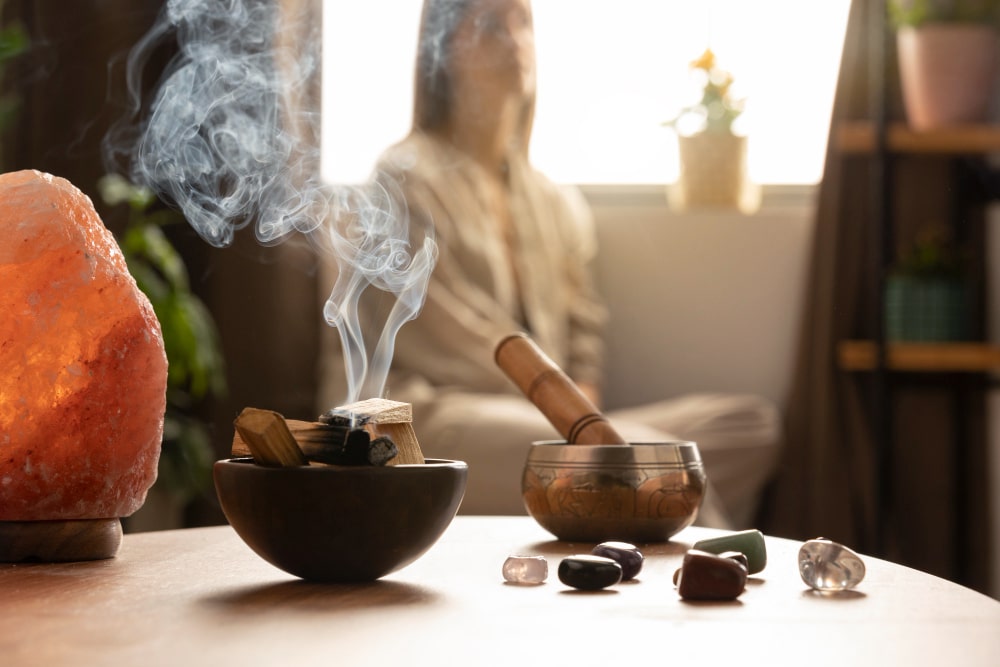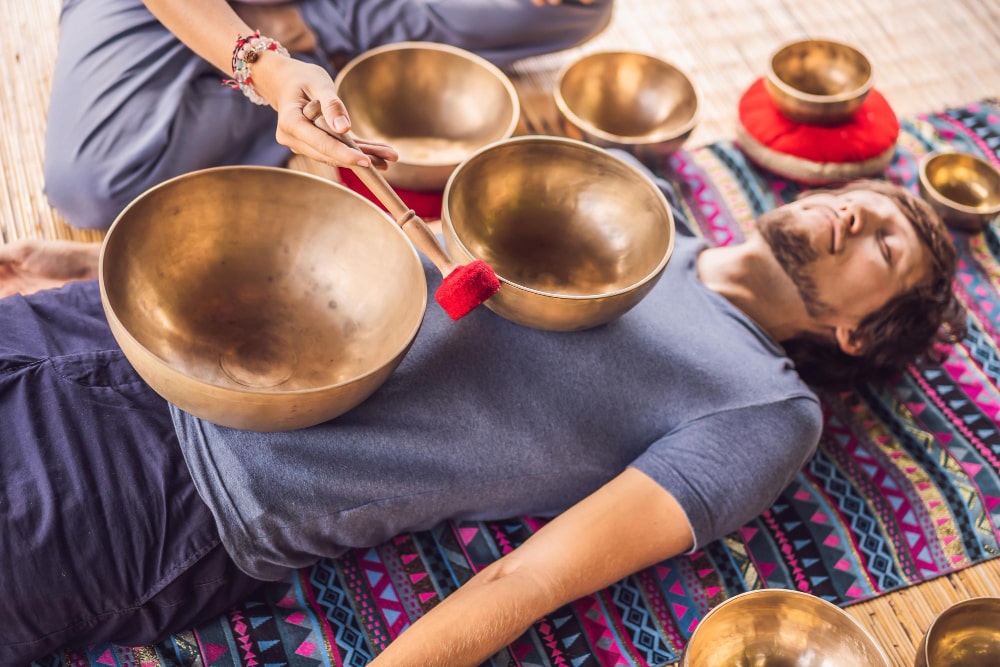
Have you been feeling stressed and anxious lately? Are you searching for easy ways for stress management? Between work deadlines, relationship issues, health problems, and everyday worries, it’s no wonder many people struggle to relax and de-stress. While exercise, meditation, and deep breathing are popular recommendations for alleviating stress and anxiety, there are many other unconventional strategies you may not have considered. In this article, you’ll discover some lesser-known but highly effective ways to break free from the clutches of stress and reconnect with your calm, balanced self. From aromatherapy and sound healing to herbal remedies and sensory meditation, you’ll find a variety of innovative techniques tailored to your unique needs and preferences. So take a deep breath and dive in – your journey to inner peace and tranquility begins now.
1- Understanding Stress and Its Effects

Stress impacts both your mind and body in ways that can significantly reduce your quality of life if left unmanaged. The most common symptoms of stress include:
- Difficulty sleeping or excessive sleeping
- Lack of energy or motivation
- Irritability or moodiness
- Difficulty concentrating
- Changes in appetite
- Tension headaches
- Upset stomach
It’s critical to understand how stress affects you personally so you can make a plan to better cope with challenges and ease anxiety.
Ways to do Stress Management
Some of the best ways to do stress management involve self-care techniques like exercising, practicing mindfulness meditation, spending time in nature, limiting alcohol/caffeine intake, and nurturing your relationships. Don’t underestimate the power of simple pleasures, either. Do small things each day that spark joy like reading, crafting, gardening or pursuing a hobby.
Make downtime a priority and give yourself space when you’re feeling overwhelmed. Staying socially connected to others can also help put your worries into perspective and boost resilience. Reduce stressors when you can, accept what you can’t change, and take good care of yourself. You’ll be feeling calmer and more in control in no time.
2- The Power of Aromatherapy in Stress Management

Essential oils are concentrated extracts from plants that contain natural aromatic compounds. When inhaled, these compounds can have powerful effects on your mind and body. Some of the lesser-known oils that can help stress management and encourage relaxation include:
- Ylang-ylang oil has soothing and uplifting properties. Just a few drops in a diffuser can calm the nerves and lift your mood.
- Bergamot oil has a citrus scent that is refreshing and mood-boosting. It helps alleviate anxiety, reduce stress, and encourage feelings of joy and optimism.
- Clary sage oil has a nutty, herbaceous aroma. It works as a natural sedative, calming the mind and body. Studies show it can help decrease anxiety and symptoms of panic attacks.
- Frankincense oil has an earthy, uplifting scent and has been used for centuries to relieve anxiety, calm the mind, and induce a sense of peace. It works by slowing down breathing and controlling heart rate.
- Patchouli oil has a musky, earthy aroma. It is great for stress management and relieving anxiety because it has a grounding and balancing effect. It helps calm a racing mind and ease feelings of being overwhelmed.
Aromatherapy is an easy way to do stress management. Just a few drops of essential oil in a diffuser can do wonders for your mood and mental state. The aromatic compounds are inhaled and absorbed into your bloodstream, acting as natural anxiety relievers and mood boosters. So take a deep breath and let the calming scents of aromatherapy soothe your stress.
3- Stress Management with Sound Healing

Sound healing is an ancient practice that uses vibrational frequencies to slow down the body and mind. Originally developed in ancient Egypt and Greece, sound healing uses instruments like tuning forks, Tibetan singing bowls, and gongs to create calming sounds and vibrations.
a- Lesser-Known Sound Healing Tools & Stress Management
Beyond the popular Tibetan singing bowls, there are other instruments used in sound healing. Tuning forks, for example, vibrate at specific frequencies that correspond to different chakras or energy centers in the body. When the tuning forks are struck, their vibrations are placed on or around the body to stimulate these energy points. Crystal bowls are another tool, made of crushed quartz and frosted glass, that create deep, meditative tones when struck with a mallet.
The vibrations from these instruments are said to slow down brain waves, relax the body, decrease stress hormones like cortisol, and increase feel-good hormones like dopamine. The calming sounds can also help shift your mind away from stressful thoughts, inducing a meditative state.
b- Unconventional yet Easy Stress Management Technique
While sound healing may seem unconventional, many people find the calming tones and vibrations help them unwind and release tension. The instruments are easy to use at home for self-care, with guided meditations and videos available online to help you get started. If you struggle with anxiety or have trouble relaxing, sound healing could be worth exploring as an alternative stress management strategy. The gentle, soothing sounds may be just what you need to shift into a peaceful state of being.
Give sound healing a try. The calming tones could be music to your stressed mind and body.
4- Unconventional Exercise for Stress Management

Unconventional exercise forms are a great way to release pent up stress and tension. Two unique options to try are forest bathing and laughter yoga.
a- Forest Bathing
Forest bathing, or shinrin-yoku, is the practice of spending time immersed in a forest environment. Studies show it can lower stress hormone levels and blood pressure. Take in the sights, sounds, and scents of the forest. Feel the fresh air on your skin and the soft earth under your feet. Walk slowly and mindfully, staying present in the moment. Even just 15-20 minutes of forest bathing can help wash away stress as it is one of the most ancient yet advanced stress management technique.
b- Laughter Yoga
Laughter yoga combines laughter exercises with yogic breathing. It may sound silly, but laughter has real health benefits. It releases endorphins that improve your mood and act as natural painkillers. Laughter yoga practitioners do a series of chuckling, giggling, and laughter exercises. Try lion laughter, greeting laughter, argument laughter or cell phone laughter. The forced laughter soon becomes real, uncontrollable laughter. A good belly laugh can burn calories, reduce stress chemicals in your blood, and leave you feeling joyful and relaxed.
Other unconventional exercises include tai chi, qi gong, dance therapy, and animal yoga. Any movement done with mindfulness can transform into a meditative, stress-relieving practice. So get outside, laugh without abandon, and try something new. Your body and mind will thank you.
5- The Therapeutic World of ASMR

Autonomous Sensory Meridian Response (ASMR) is a relaxing, tingling sensation that begins on the scalp and moves down the body. ASMR is usually triggered by soft sounds, like whispering, brushing, and tapping.
ASMR videos typically feature people speaking softly, making repetitive hand motions or sounds. These “ASMRtists” create an immersive experience for viewers. For many, the tingling sensation of ASMR, often described as “brain massage”, provides a sense of calm and tranquility.
You may have experienced ASMR before without realizing it. Some common triggers include:
- Gentle whispers or speaking softly
- Tapping fingernails or scratching
- Brushing hair or touching fabric
- Page turning
- Typing on a keyboard
To experience ASMR, find a quiet and distraction-free place. Use headphones to immerse yourself in the sounds. Start with ASMR videos on YouTube – there are many to choose from. See what triggers give you tingles. Let your mind relax and focus on the sounds and sensations.
a- Why ASMR?
The benefits of ASMR are still being studied, but many report decreased anxiety, improved sleep, and an elevated mood after listening to ASMR audio or videos. ASMR may also decrease symptoms of depression and chronic pain. While ASMR does not work for everyone, it is a simple, low-cost way to unwind and de-stress when triggered.
Give ASMR a try. Discover which sounds give you tingles and bliss out. Let the soft whispers and gentle tapping whisk your worries away and usher in a sense of calm. ASMR just may become your new favorite relaxation technique and introduce you to a therapeutic world of sounds and sensations.
6- Embracing the Joy of Creative Expression

Creative expression is a powerful way to do stress management that many overlook. Engaging in creative activities helps shift your mind from the worries and anxieties of everyday life, giving your mind a chance to rest. Studies show that art therapy and creative pursuits can decrease symptoms of stress and anxiety, and boost positive emotions.
a- Everybody can be an Artist
You don’t have to be an artist to reap the benefits of creative expression. Simple activities like expressive writing, doodling, coloring or intuitive painting offer an outlet to explore your thoughts and feelings. Expressive writing, in particular, has been found to improve both physical and mental health. Spending just 15-20 minutes a day writing about stressful experiences can decrease symptoms of anxiety and depression.
b- Pick Up the Pen
If writing isn’t your thing, try doodling or zentangling. The repetitive patterns are meditative and help calm the mind. Adult coloring books are another option. The focused, repetitive action of coloring activates the same parts of your brain as meditation. Put on some relaxing music, pour yourself a cup of tea and get lost in the flow.
c- Play with Paints
For a more free-form creative outlet, try intuitive painting. You are competing or proving anything to anyone, so just focus on having fun with colours. Don’t focus on the end result or judge what you create. Just move the brush across the page and see what emerges. The loose, unstructured process of intuitive painting is highly therapeutic. Mix colors together, make abstract shapes – do whatever feels good. Your creation is meant to be an expression of your inner self, not a masterpiece.
Unleashing your creativity is a simple way to give your mind a break from stress and worry. Engaging in expressive arts not only helps you relax, but can lead to new insights and a sense of personal growth. Make creative expression a habit and discover the joy to be found when you stop judging yourself and just create.
7- The Calming Effect of Herbal Remedies

Herbal remedies have been used for centuries to promote relaxation and ease anxiety. Many herbs contain compounds that work directly on the nervous system to calm the body and mind. Two lesser-known but effective herbal relaxants are passionflower and valerian.
a- Drinking Herbal Tea for Stress Management
Passionflower is a flowering vine that produces a mildly sedative effect. You can find passionflower in the form of herbal tea, tincture, or capsules. To make a calming tea, steep 1-2 teaspoons of dried passionflower in a cup of hot water for 10-15 minutes. The tea has an earthy, slightly bitter taste that you can sweeten with honey if needed. Passionflower tinctures and extracts are also available, with a typical dosage of 30-60 drops in water up to three times per day.
b- Using Roots as natural Remedy
Valerian is another herb used for centuries as a natural sedative. The root of the valerian plant contains valerenic acid, which helps regulate the GABA system in the brain to promote sleepiness and tranquility. Valerian tea, tinctures, and capsules can be found at most health food stores. To prepare one cup of this tea, steep 1 teaspoon of dried valerian root in a cup of hot water for 10-15 minutes. The taste can be quite strong, so honey and lemon are recommended to improve flavor. Tinctures and extracts are also popular, with a typical dosage of 1/2 to 1 teaspoon in water, one to three times a day.
Using herbal remedies, you can create your own relaxation ritual to unwind in a natural way. Keep experimenting with different herbs, teas, and tinctures until you find the best suitable option as per your needs. When used properly and according to the recommended dosages, herbal remedies can be a safe and effective way to embrace calm and find your zen.
8- Exploring Sensory Meditation

Sensory meditation involves focusing your awareness on your senses as a way to relax your mind and body. In this relaxation state your conscious mind gets more active as it is free from the chaos of daily life and pay close attention to sights, sounds, scents, tastes, and textures, it helps shift your focus from a state of stress to a state of calm.
a- Scent Meditation
Light a scented candle or essential oil diffuser and focus on the aroma. Breathe in through your nose and out through your mouth, noticing how the fragrance changes from the initial notes to the middle notes to the base notes. Try to detect the individual scents that make up the overall fragrance. This simple practice helps anchor your awareness in the present moment.
b- Taste Meditation
Select a piece of chocolate, fruit, or other snack and hold it in your mouth without chewing. Notice how the taste evolves over time. Pay attention to the initial burst of flavor, how it spreads over your tongue, and the more subtle tastes that come through as your saliva mixes with the food. Focus on the texture, temperature, and mouthfeel as well. This meditation helps you slow down and savor an ordinary experience.
While unconventional, sensory meditation techniques like these offer a creative way to unwind. By shifting your focus away from your thoughts and onto your senses, you give your mind a chance to rest. These practises require patience and time, so do not give up and stay positive.
9- The Therapeutic Influence of Colors
Each colour has it is own psychological effect on us. Color is one of the most influential yet underutilized therapies for stress management and mood enhancement. The colors around us, whether in our home decor, clothing choices, or natural environment, significantly impact our psychological and emotional well-being.
a- The Soothing Power of Blue

The color blue is associated with feelings of calmness and tranquility. Surrounding yourself with shades of blue can help lower your heart rate and blood pressure, relaxing your mind and body. Try painting an accent wall in your home a soft blue hue or add blue decorative accents like throw pillows, rugs, or artwork. Wearing blue clothing or jewelry is an easy way to harness the soothing power of this color throughout your day.
b- Orange You Glad?

While blue is calming, the color orange is energizing and uplifting. If you’re feeling stressed, depressed or unmotivated, bring the color orange into your life. Orange stimulates feelings of warmth, cheerfulness and creativity. Add orange flowers, table linens, kitchen accessories or paint an orange feature wall in your home office or creative space. The vibrant and zesty energy of orange will banish the blues and renew your motivation.
c- Go Green

The color green symbolizes growth, renewal and harmony with nature. Surrounding yourself with green helps create feelings of balance and restoration. Houseplants, green throw blankets, emerald green decorative accents or foliage in your garden are all easy ways to bring the tranquility of green into your daily life. Escape into nature by going for a walk in a forest or park. The greenness will soothe your stress and reconnect you with a sense of peace.
Exploring how different colors influence your mood and experimenting with color therapy techniques is a simple way to embrace a holistic approach to stress management and wellness. Harnessing the power of color through your surroundings, clothing and activities is a lesser-known yet highly effective strategy for relaxation and rejuvenation.
10- Reconnecting with Nature

Connecting with nature is one of the most effective yet underrated ways to do stress management and recharge. Spending time outside exposes you to natural light which helps regulate your circadian rhythm, and fresh air provides respiratory benefits. Ecotherapy, also known as nature therapy, refers to the practice of social, physical, and emotional wellbeing through the natural environment.
You can start by doing simple activities like:
- Going for a walk in a park or your neighborhood. Walking barefoot on grass or sand, known as grounding, is thought to discharge built-up energy and provide an energizing effect.
- Sitting outside and stargazing at night. Gazing up at the night sky helps you gain a new perspective and realize how small your worries are in the grand scale of the universe.
- Gardening or growing indoor plants. Caring for greenery has been shown to lower stress levels and blood pressure.
For extra relaxation, find a secluded natural area to sit, listen to calming nature sounds, breathe in fresh air, and fully immerse your senses. Pay attention to the little details around you – the rustling of leaves, chirping birds, sensations of the sun on your skin. This mindful sensory experience can shift your mind from a state of stress and worry to a peaceful calm.
Spending just 30 minutes a day outside in nature can significantly improve your mood and reduce stress levels. Make reconnecting with nature a habit and you’ll reap both physical and mental benefits. Your body and mind will thank you for the opportunity to unwind in the great outdoors.
11- The Benefits of Laughter Therapy
Laughter therapy is one of the most uplifting and memorable ways to do stress management and boost your mood. The benefits of laughter are both instantaneous and long-lasting. Even just smiling or giggling can lighten your mood and make you feel good.
a- Release Endorphins
When you laugh, your body releases endorphins, the feel-good hormones that act as natural painkillers and also improve your mood. Endorphins are responsible for the “runner’s high” and laughing triggers a similar reaction. Laughing also leads to a decrease in stress hormones like cortisol.
b- Relieve Tension
Laughing helps relax your muscles and relieve physical tension. It also helps you forget your worries for a while and shifts your mindset to a more positive state. Laughing fully engages your body, increases your heart rate and blood flow, which in turn has a tranquilizing effect.
c- Boost Immunity
Laughter may help boost your immunity by increasing the number of antibodies and immune cells in your body. It also decreases inflammation in the arteries and improves your body’s ability to use oxygen. People who laugh heartily on a regular basis tend to have stronger protection against illnesses like the common cold.
d- Improve Relationships
Laughter connects you with others and strengthens relationships. When you laugh with others, you release endorphins that improve your mood and create positive feelings between people. Laughter also breaks down social barriers and brings people together through a shared experience. Make a habit of laughing with friends and loved ones as much as possible.
In summary, laughing more every day is one of the easiest and most natural ways to do stress management. And the benefits are endless. So laugh loud, laugh often, and encourage others to join in. Laughter is truly contagious!
FAQ: Everything You Need to Know About Stress Management
Stress affects us all, but the good news is there are many ways to manage it. Here are some of the most frequently asked questions about lowering stress levels:
a- How can I relieve stress quickly?
When you’re feeling overwhelmed in the moment, try these fast-acting stress management techniques:
- Take some deep breaths. Slow, deep, abdominal breathing can help lower your heart rate and blood pressure, reducing feelings of stress.
- Do light exercise. Go for a quick walk or do some gentle yoga stretches. Exercise releases feel-good hormones that combat stress.
- Listen to calming music. Put on relaxing instrumental music, nature sounds or a meditation soundtrack. Music is very effective for shifting your mood and mindset.
b- What are the best long-term strategies for stress management?
To lower your stress levels over the long run, focus on self-care through:
- Getting enough sleep. Choose bedroom furniture wisely and aim for 7 to 9 hours of sleep per night to allow your body and mind to rest. Lack of sleep exacerbates stress.
- Eating a healthy diet. A balanced diet can boost your mood and reduce irritability. Focus on whole foods like fruits and vegetables, whole grains, and lean protein.
- Practicing meditation or mindfulness. Spending just a few minutes a day being fully present in the moment can help decrease stress and negative emotions.
- Spending time with others. Social support from family and friends is vital for wellbeing. Connecting to others helps combat stress.
The key is finding a combination of strategies that work for your needs and lifestyle. No one solution fits all, but by experimenting with different coping tools, you can build your own calming toolkit to embrace a more stress-free life. The power to lower your stress levels is within your control.
Take Away
Well there you have it, a dozen or so unconventional stress management and relaxation techniques you may not have known about before to help bust stress and boost wellbeing. You have nothing to lose and your mental and physical health have everything to gain. Make self-care a priority and take time each day to unwind and de-stress. Life moves fast, so slow down and savor the simple pleasures. Break free from the shackles of stress and embrace relaxation – your mind and body will thank you for it.

